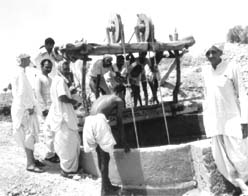Words of wisdom
 traditional knowledge refers to the unique local knowledge existing within and developed around the specific conditions of people indigenous to a particular geographic area. All members of a community have traditional knowledge about the ecology: elders, women, men and children. However, the quantity and quality of traditional knowledge possessed by each individual vary from person to person. Age, education, gender, social and economic status, daily experiences, outside influences, roles and responsibilities in the home and community, available time, aptitude and intellectual capability are some of the influencing factors.
traditional knowledge refers to the unique local knowledge existing within and developed around the specific conditions of people indigenous to a particular geographic area. All members of a community have traditional knowledge about the ecology: elders, women, men and children. However, the quantity and quality of traditional knowledge possessed by each individual vary from person to person. Age, education, gender, social and economic status, daily experiences, outside influences, roles and responsibilities in the home and community, available time, aptitude and intellectual capability are some of the influencing factors.
Although each traditional knowledge system consists of an integrated body of knowledge, researchers interested in learning more about traditional knowledge systems tend to focus on discrete aspects. The various aspects of traditional knowledge include a community's definitions and classifications of local flora and fauna, soil conservation practices, animal breeding, traditional water management, human disease classification system and community controls on harvesting, to name a few.
Erosion of traditional values As people across the world become increasingly appreciative of the value of traditional knowledge, there is also growing awareness that biodiversity, cultural diversity and the traditional knowledge system are threatened with extinction. Some traditional knowledge is also lost naturally as techniques and tools are modified or become extinct.
However, one of the main causes for the erosion of traditional knowledge is population growth. Often, due to in-migration or government relocation schemes in the case of large development projects like dams, standards of living may be compromised. With poverty, opportunities for short-term gain are selected over environmentally-sound local practices. With increasing poverty, farmers, for instance, may also have fewer resources to sustain the dynamic nature of traditional knowledge systems through their local experiments.
Farmers traditionally maintained their indigenous crop varieties by keeping household seed stocks. They also obtained seeds through traditional family and community networks and through exchanges with nearby communities. Some of these traditional networks have been disrupted or no longer exist.
Attempting a revival However, interest in this "old' knowledge is being revived in tandem with the politicisation of indigenous groups and indigenous rights movements. Indigenous communities are demanding the right to be involved in development projects.
Concurrently, many governments worldwide are showing willingness to pay heed to the requirements of the indigenous people. Moreover, of late, traditional knowledge has been lauded as an "alternative to collective wisdom relevant to a variety of matters at a time when existing norms, values and laws are increasingly called into question.' In other words, development planning has often failed to achieve the desired result: sustainable development.
Western scientific approaches are in themselves insufficient to address today's complex web of social, economic, political, and environment challenges. Whereas Western science attempts to isolate a problem, traditional approaches examine problems in their totality. For example, physicians are realising the importance of including the physical, spiritual, socio-cultural and psychological well-being of a person when considering matters of health. Although this is a fairly new concept for modern medicine, this holistic approach is the basis of many traditional systems.
The author is a project coordinator with the Kumarappa Institute of Gram Swaraj, Jaipur
